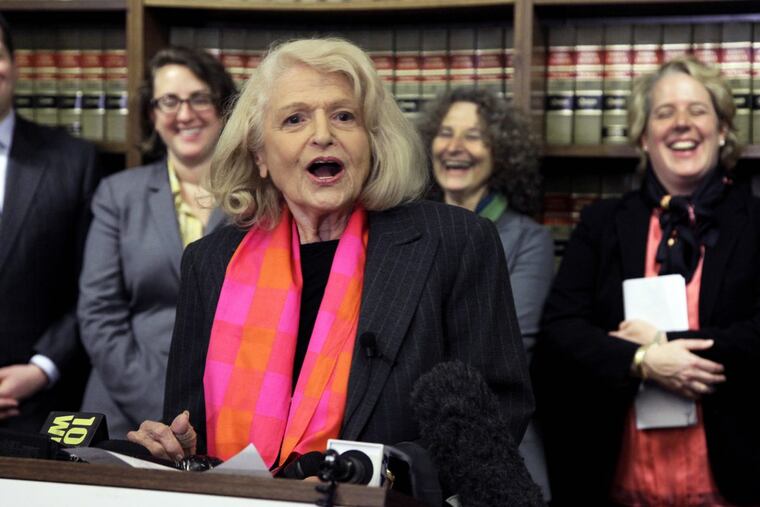Edith Windsor, Philly native who helped end gay marriage ban, dies at 88
Edith Windsor, 88, a Philadelphia native who secured landmark Supreme Court rulings that led to the legalization of same-sex marriage nationwide, died Tuesday in New York.

Edith Windsor, 88, a Philadelphia native who secured landmark Supreme Court rulings that led to the legalization of same-sex marriage nationwide, died Tuesday in New York.
No cause of death was provided, but Ms. Windsor had suffered from heart problems in recent years.
Ms. Windsor, who earned a bachelor's degree from Temple University in 1950, became a gay rights pioneer after her longtime partner and spouse, Thea Spyer, died in 2009, and she faced hundreds of thousands of dollars in estate taxes because the federal government only allowed marital deductions for heterosexual couples.
She filed a lawsuit, and in June 2013, the U.S. Supreme Court ruled 5-4 that she had been unconstitutionally denied federal benefits. That led to a 2015 high court ruling that gave same-sex couples the right to marry.
"The world lost a tiny but tough-as-nails fighter for freedom, justice and equality," her current spouse, Judith Kasen-Windsor, told the Associated Press. They married last year.
Anthony Romero, executive director of the American Civil Liberties Union, called Ms. Windsor "one of the country's great civil rights pioneers."
Ms. Windsor was a finalist for Time magazine's Person of the Year in 2013 and was invited the following year to a state dinner at the White House for then-French President Francois Hollande.
In 2014, Ms. Windsor was honored at Temple University for her activism and Mayor Michael Nutter proclaimed "Edie Windsor Day" in Philadelphia.
Ms. Windsor was born in 1929 to Jack and Celia Schlain and was the youngest of three siblings, said Rem Rieder, her nephew and former editor at large of USA TODAY and onetime Inquirer reporter.
After she graduated from Temple, she was briefly married to Saul Windsor, Rieder said. They divorced, but she kept her married name.
Ms. Windsor soon moved to New York, where she earned a master's degree in mathematics from New York University and then went to work for IBM.
In 1963, she met Thea Spyer, a clinical psychologist.
During a drive together four years later, Ms. Windsor told The Inquirer in 2014, Spyer asked her what would happen if she wore an engagement ring at work. Ms. Windsor said she couldn't do it because people would ask "who he is."
Ms. Windsor then recalled, "when we got out of the car, she got down on her knees and said, 'Edie Windsor, will you marry me?' " Spyer gave her a pin with a circle of diamonds that Ms. Windsor wore into her final years.
"Our choice not to wear traditional engagement rings was just one of many ways in which Thea and I had to mold our lives to make our relationship invisible," Ms. Windsor said in court documents.
Spyer was diagnosed with multiple sclerosis in 1977 and after years of declining health the couple married in Toronto in 2007.
Ms. Windsor later said about being married: "There's something profound. It's not just becoming an equal citizen — it's more than that. It's like your dreams as a 6-year-old, suddenly they're all real."
"Edie and Thea's was a truly remarkable love story," Rieder said "And after Thea's death, Edie became an important champion of gay rights and a source of inspiration to many. But she was also the aunt who showed her young nephews around Greenwich Village and took me, an avid stamp collector as a lad, to the wonderful stamp stores on Nassau Street."
News of Ms. Windsor's death sparked an outporing of grief at her passing and gratitude for what she had accomplished.
U.S. Rep. Nancy Pelosi, the Democratic leader from California, wrote on Twitter: "Today, we mourn the life of Edie. With pride & bravery, she refused to accept injustice. Your legacy of LOVE moved us ALL forward."
U.S. Sen. Dianne Feinstein, another Democrat from California, tweeted: "Edith Windsor made this country better. Her courage means millions of Americans can now marry the person they love. #LoveWins"
George Takei, the famed Star Trek actor and gay-rights advocate, tweeted: "Edith Windsor changed history by winning her case and ushering in marriage equality. Her legacy will live on forever. Rest in peace, Edie."
This article contains information from the Associated Press.